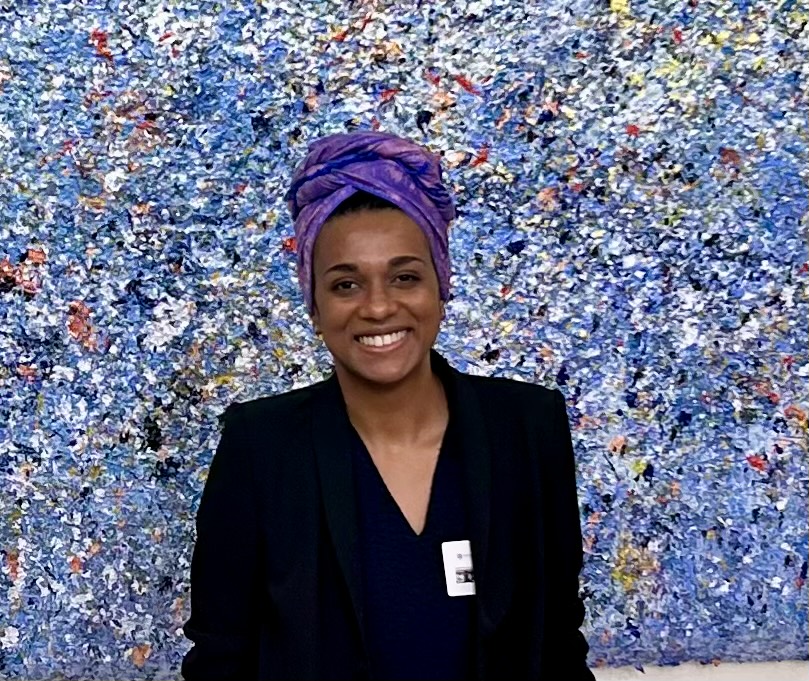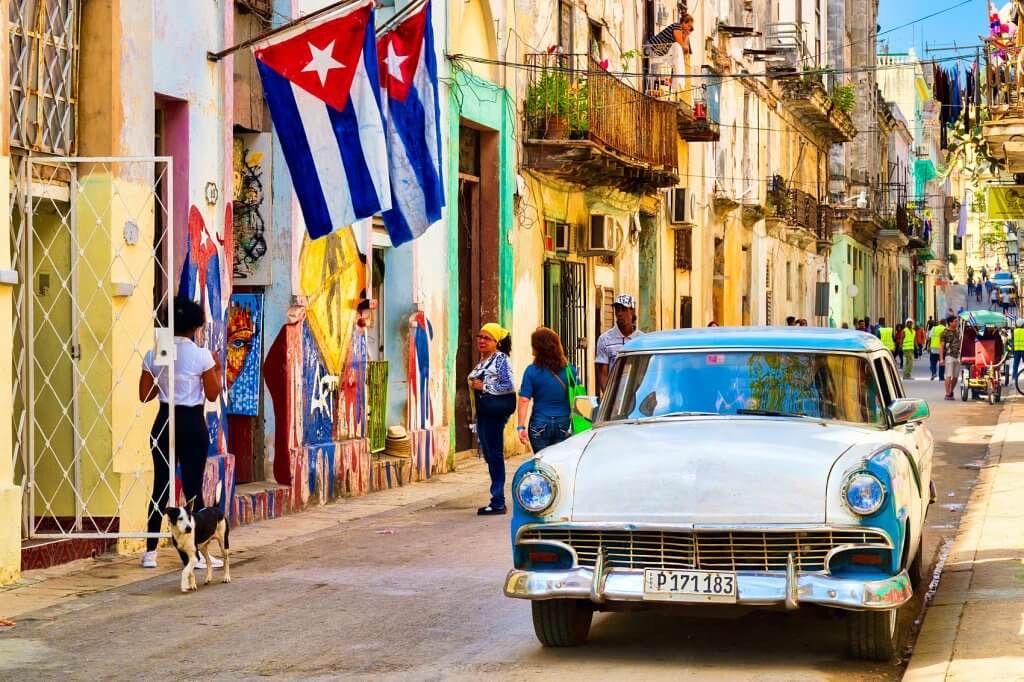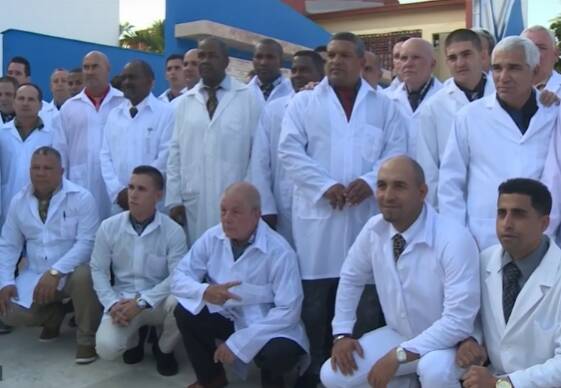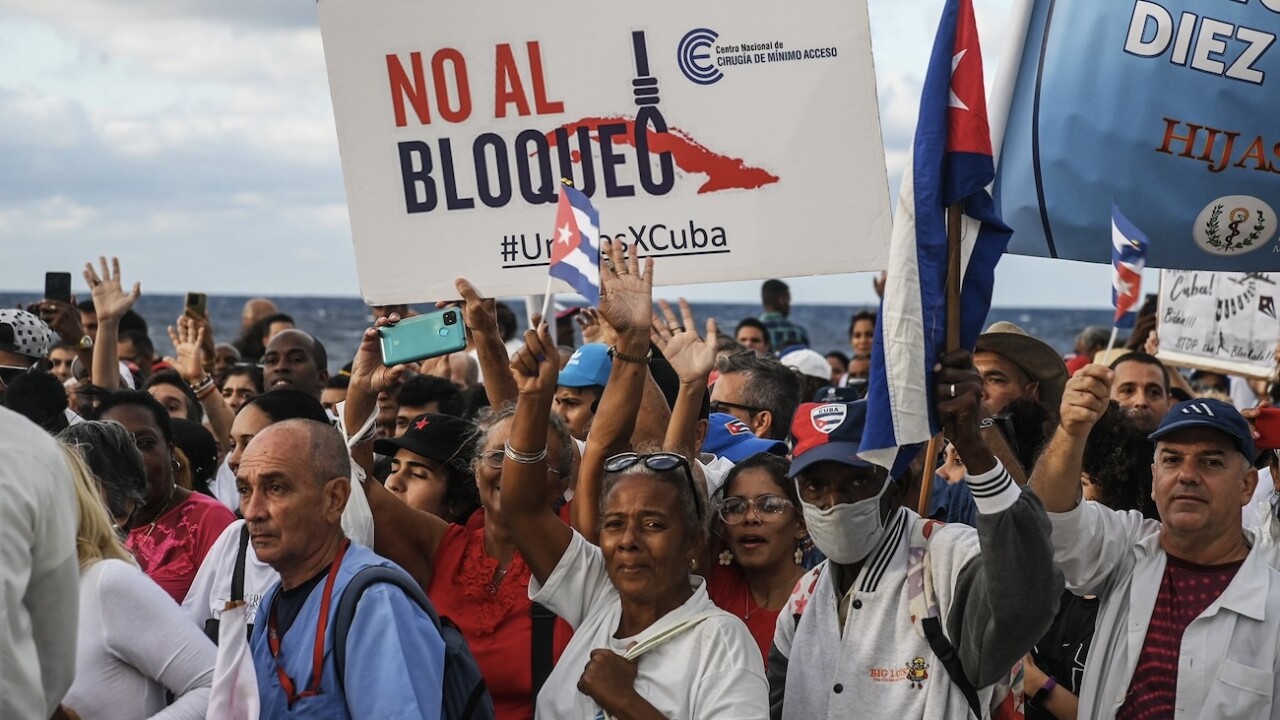
by The People’s Minister of Information JR Valrey
The socialist government of Cuba has been contradicting U.S. dominance – economic, political, social – in the Caribbean and throughout the Western Hemisphere since the beginning of the Cuban Revolution in the late 1950s.
A blockade against Cuba, imposed 61 years ago by the U.S. government and supported solely by Israel, has tried to implode the Cuban government from the inside and punish the Cuban people for standing up to the Monroe Doctrine – which speaks to the U.S. being the self-imposed imperialist boss in the region.
Since the beginning of the Trump regime, Secretary of State Marco Rubio, a Cuban American, has been trying to use any and everything in his political tool box to increase pressure, to try and break the will of the Cuban government and people to operate sovereignly from the U.S. government’s dictates.
Some of these tactics have included turning Guantanamo Bay prison into a concentration camp for deportees from the U.S., claiming that the Cuban government is trafficking and enslaving doctors that participate in its international medical brigades, as well as sending Cuban nationals that were deported from the U.S. to South Sudan, a country that they have no connection to, as well as it is an active war zone where genocide is occurring.
Gabriella Castillo currently serves as an official in the Political Affairs Office of the Embassy of Cuba, acting as the mission’s liaison to the Black community in the U.S. and the broader African diaspora.
MOI JR: Why is what the U.S. imposes on Cuba not an “embargo” – but a blockade?
Gabriella Castillo: The U.S. government often refers to its policy toward Cuba as an “embargo,” but that label doesn’t reflect the scope or true nature of the measures imposed. What exists is, in fact, an economic, commercial and financial blockade, with extraterritorial reach and severe consequences for the everyday lives of the Cuban people.
Legally speaking, an embargo refers to the suspension of trade or the seizure of goods by a competent authority, usually to enforce compliance with legal or financial obligations. In international law, an embargo might be imposed unilaterally to regulate trade with a specific country. But Cuba has committed no crime and owes no debt to the United States that could justify such action. Nor does Cuba pose any threat to U.S. national security.
The U.S. measures meet the definition of a blockade: a policy designed to isolate, cut off and paralyze Cuba economically, commercially and financially, with the explicit goal of forcing surrender through deprivation.
Under international norms, a blockade is considered an act of war and can only be justified between warring parties – which Cuba and the U.S. are not.
That’s why we don’t call it an embargo. It’s a blockade: illegal, aggressive and enforced through a system of sweeping coercion that:
• Bans direct and indirect trade with the U.S.
• Targets and penalizes Cuba’s trade and financial relations with third countries.
• Fines foreign banks and companies that do business with Cuba – even when those transactions are legal under their own laws.
• Blocks access to medical equipment, pharmaceuticals, food and essential raw materials.
• Restricts internet access, digital platforms and international banking services.
All of this is part of a deliberate effort – as acknowledged in declassified U.S. documents (see the 1960 Lester Mallory memorandum) – to sow hardship and unrest among the Cuban population in hopes of collapsing the country from within.
The blockade has been repeatedly condemned by the international community. Since 1992, the United Nations General Assembly has overwhelmingly approved annual resolutions titled “The necessity of ending the economic, commercial, and financial embargo imposed by the United States of America against Cuba.”

1-UN Resolution 2625 (1970) clearly states that no state may use economic or political measures to coerce another state in the exercise of its sovereign rights. The blockade also violates the Cuban people’s right to self-determination, as protected by the UN Charter and core international human rights treaties.
The U.S. government tries to frame this policy as a targeted embargo or a diplomatic tool. But in practice, it amounts to undeclared economic warfare – one that directly impacts the daily lives of Cubans on and off the island. Its goal is to break a nation’s will through sustained suffering and material deprivation. For that reason, many view it as a crime against humanity.
Calling this a mere “embargo” is a distortion of both legal and political reality. The U.S. policy toward Cuba is a blockade in every sense – designed to crush the country’s sovereign choices and independence. It is illegal, inhumane and extraterritorial. It stands today as one of the longest-running and most punishing acts of economic aggression in modern history.
This is not just a semantic debate. The difference between “embargo” and “blockade” is a matter of truth and justice. What the Cuban people endure is not a limited or selective restriction – it’s a full-scale siege. A form of collective punishment aimed at breaking a nation’s spirit. And that, by any honest name, is a blockade.
MOI JR: How does the U.S. blockade impact everyday life in Cuba today?
Gabriella Castillo: The U.S. blockade is not just a foreign policy issue – it directly affects every aspect of daily life for Cubans. This policy, enforced through a complex web of laws, sanctions and extraterritorial restrictions, costs the country billions of dollars each year and blocks access to vital goods and services. Below is a snapshot of how it impacts key areas of Cuban society:
Health care
Cuba’s public health system, known for being free and universal, is severely hampered by the blockade. Between March 2023 and February 2024, losses in the health sector totaled over $268 million. But beyond numbers, the real toll is human: shortages of medicines, delayed surgeries (including for over 9,000 children) and breakdowns in critical equipment due to lack of spare parts. Even during the COVID-19 pandemic, Cuba was denied access to urgently needed medical oxygen from U.S. suppliers.
Food security
The agricultural sector lost over $440 million in the same period due to restrictions on equipment, fertilizers and access to international financing. Cuban farmers are forced to rely on outdated tools and face major delays in receiving supplies – even those already paid for – because banks and companies fear U.S. sanctions.
Education
The blockade also impacts schools. The cost of producing basic educational materials – uniforms, textbooks, school supplies – has skyrocketed. Children with disabilities are especially affected due to the shortage of specialized equipment and medicines. In higher education, universities are blocked from accessing software, digital libraries and even scientific equipment that contains U.S.-made components.
Sports and culture
Cuba’s athletes and artists face travel restrictions, banking obstacles, and limited access to equipment. Sports teams are unable to receive payment for international competitions, and training equipment is often outdated or unavailable. Musicians and cultural institutions are blocked from earning income through global platforms like Spotify and Vevo. U.S. pressure has even led to cancellations of cultural exchanges, such as Norah Jones’ planned visit to Cuba.
Tourism
The U.S. government heavily restricts travel to Cuba. American citizens cannot visit freely as tourists and must follow narrow, regulated categories. Hundreds of Cuban hotels and tourist businesses are blacklisted. This has cost Cuba nearly $2.5 billion in lost tourism revenue in just one year. Inclusion on the U.S. list of “State Sponsors of Terrorism” has also discouraged visitors from Europe and other countries, due to added visa restrictions when traveling to the U.S.
Energy and basic services
U.S. sanctions target oil shipments to Cuba, affecting more than 50 vessels and 27 companies. This has led to ongoing fuel shortages and power outages that impact daily life, from food preservation to hospital care.
Finance and banking
Cuba has been cut off from much of the global financial system. In one year alone, 48 foreign banks refused to work with Cuba, resulting in $360 million in banking-related losses. The country must pay cash upfront for nearly all imports – no credit or payment plans allowed – raising prices across the board. Inflation reached 30% in 2023, and up to 72% for food.
Biotech and scientific innovation
Despite the blockade, Cuba has developed its own vaccines and cancer treatments. But the U.S. embargo blocks access to lab materials and scientific exchanges. The sector lost over $124 million in a single year due to these restrictions.
Media and information warfare
Washington funds digital platforms and campaigns aimed at destabilizing Cuba’s economy and government. These include efforts to manipulate currency exchange rates and discredit public institutions, contributing to economic uncertainty and misinformation.
In summary
The blockade goes far beyond political rhetoric. It is a deliberate policy of economic strangulation that targets ordinary Cubans – from farmers and doctors to children and the elderly. It restricts access to food, medicine, education, travel and opportunity.

M.O.I. JR: Recently U.S. government officials have accused the internationally known Cuban Medical Brigades of human trafficking and forced labor. Can you give people the true history as well as speak on the crying need in the oppressed world for this type of solidarity?
Gabriella Castillo: The accusations made by certain U.S. government officials – that Cuba’s international medical cooperation programs constitute human trafficking or forced labor – are deeply offensive, politically motivated and entirely false.
Cuba’s Medical Brigades are a source of national pride. Since 1963, when the first group of Cuban doctors traveled to Algeria, more than 600,000 Cuban health professionals have provided care in 165 countries, often in the most remote and underserved communities, from Africa to Latin America, Asia and even Europe. These missions are rooted in the values of solidarity, humanism and internationalism that define our health system and foreign policy.
Far from being victims, the Cuban doctors who volunteer for these missions do so freely and voluntarily. They are trained in a system where healthcare is not a commodity, but a human right, and many see it as both a professional and ethical calling to serve where they are needed most. In return, their families are supported, their salaries continue in Cuba, and a portion of the remuneration from host countries helps fund our universal healthcare system, despite the economic hardships imposed by the U.S. blockade.
Let’s be clear: These missions save lives. When COVID-19 struck northern Italy in 2020, it was Cuban doctors who went in to help. When Haiti was devastated by earthquakes, when Ebola hit West Africa, when children go blind from preventable diseases in poor countries – Cuban doctors have been there. Not to exploit, but to heal.
The accusation of “human trafficking” is part of a broader strategy to discredit and dismantle one of the most visible examples of a non-capitalist model of international cooperation.
Around the world today, over one billion people lack access to essential health services, and millions die each year from preventable causes. The global South, in particular, faces a severe shortage of doctors and nurses. In this context, Cuba’s medical cooperation is not the problem – it is part of the solution. And it has been recognized as such by multiple UN agencies, Nobel Peace Prize nominees, and grateful governments around the world.
In short: our doctors are not victims. They are heroes. And what truly needs to be put on trial is not Cuban solidarity, but the systems that condemn millions to die in silence for lack of care.
MOI JR: How is the Cuban government looking at the recent attacks on Cuban immigrants and Cuban nationals within the U.S.?
Gabriella Castillo: Migration should be treated as a human phenomenon, not as a geopolitical weapon. For over six decades, migration has been used as a tool for political pressure against the Cuban Revolution. Since 1959, Washington has promoted an exceptional and selective migration policy toward Cuban citizens, with the declared or hidden goal of encouraging brain drain, fostering internal destabilization, and building a narrative of “fleeing communism.”
This is not speculation – it is documented in official statements and laws like the Cuban Adjustment Act, which since 1966 has provided automatic and exclusive immigration benefits to those who left the island, no matter how they arrived or under what circumstances. That law, along with policies like “wet foot, dry foot” and more recently the manipulation of humanitarian parole, has contributed to irregular and dangerous migration flows while promoting a distorted and politicized view of Cuban migration.
So, it cannot be ignored that many of the Cuban migrants now facing legal insecurity in the United States arrived through legal channels, encouraged by political rhetoric – especially from political factions in South Florida – that promised protection. Yet now, many of those same migrants find themselves unprotected, in legal limbo, separated from their families, and even sent back to Cuba.

M.O.I. JR: What is the history of U.S.-Cuban relations in regard to the history of the Guantánamo Naval Base?
Gabriella Castillo: From the Cuban government’s perspective, the U.S. military presence in Guantánamo Bay constitutes a historical violation of Cuba’s sovereignty and territorial integrity.
The so-called lease of this territory was imposed in 1903 under conditions of U.S. military occupation and extreme political imbalance following the Spanish-American-Cuban War. It was never a freely negotiated agreement between two sovereign nations.
Since the triumph of the Revolution in 1959, Cuba has consistently rejected this enclave. This refusal has been demonstrated, among other ways, by its policy of not cashing the symbolic rent checks issued by the U.S. government.
The Guantánamo Naval Base remains an open wound to Cuban national dignity and a constant reminder that a portion of Cuban territory continues to be occupied against the explicit will of its people and government. Furthermore, Cuba is openly opposed to the proliferation of foreign military bases and defends our region’s right to be a Zone of Peace.
M.O.I. JR: How does the Cuban government feel about the use of Guantánamo Base as a detention center for migrants?
Gabriella Castillo: The Cuban government views with deep concern reports about the use of the Guantánamo Naval Base as a detention center for migrants, especially under conditions that may violate their fundamental rights.
Turning occupied territory into a confinement space for human beings seeking refuge and protection does not resolve any humanitarian crisis; rather, it exacerbates problems. These practices run counter to the spirit of cooperation that should govern the management of migration flows and could contravene principles of international humanitarian law.
The people and government of Cuba have historically advocated for an approach to migration centered on respect for human dignity, the right to family reunification, and the fair and safe treatment of all individuals, regardless of their migration status.
M.O.I. JR: What is the Cuban government’s position on the U.S. government deportation of Cuban citizens to South Sudan under the Trump administration?
Gabriella Castillo: Cuba has historically been a nation that respects international law, particularly its commitments regarding migration and consular affairs. Each case involving the deportation of Cuban citizens is evaluated individually, based on multiple factors including criminal background, adherence to established procedures and, of course, national security.
Concerning this specific case, we lack official information confirming all details, making it irresponsible to issue definitive judgments. Nevertheless, we emphasize that any deportation decision must occur within:
- The framework of international law,
- The provisions of current migration agreements between Cuba and the United States,
- And with basic safeguards for the physical integrity and rights of those involved.
- When third countries become involved in this process, it becomes even more critical to uphold fundamental principles of humanitarian law.
Cuba continues to advocate for orderly, safe and regular migration, as well as dignified treatment of its citizens – regardless of individual circumstances.
M.O.I. JR: Can you detail how the blockade has affected Cuban athletes at international sporting events, not allowing for friendly competition?
Gabriella Castillo: The U.S. government’s restrictions under the economic blockade against Cuba have had a direct and profoundly negative impact on the development of Cuban sports, as well as on our athletes’ ability to compete on an equal footing in international events.
In 2025 alone, we have witnessed a concerning escalation in visa denials by the U.S. Embassy in Havana. This policy has prevented Cuban delegations from participating in key tournaments. Among the most troubling examples is that of the La Palma girls’ softball team from Pinar del Río: 14 girls aged just 9 and 10 who *did* receive visas but were unable to travel to Puerto Rico after their coaches and guardians – responsible for their safety and technical direction – were denied entry.
Similar cases have affected:
- The women’s volleyball team, barred from the NORCECA Final Four in Puerto Rico;
- The men’s basketball team, automatically disqualified from the FIBA AmeriCup due to travel restrictions;
- Members of the Cuban Olympic Committee;
- Even veteran athletes blocked from the World Masters Indoor Athletics Championships in Florida.
These actions not only violate the spirit of sport and the Olympic Charter but constitute institutionalized discrimination. They subject an entire nation’s athletic development – especially that of its children and youth – to purely political conditions.
Sport should be a realm for understanding, friendship and fair competition among peoples. Yet the blockade and unilateral measures like systematic visa denials prove that for certain U.S. government sectors, not even fair play is spared from political hostility toward Cuba.
M.O.I. JR: What are your thoughts on how Cuban nationals are being treated at so-called Alligator Alcatraz?
Gabriella Castillo: Here’s the precise diplomatic translation consistent with your previous statements:
As diplomats we have a responsibility to express our deep concern regarding any situation affecting the dignity, rights, or physical and emotional integrity of Cuban citizens, wherever they may be.
In this context, we have closely followed reports concerning conditions at migrant detention centers such as “Alligator Alcatraz.” Our Foreign Minister, Bruno Rodríguez, and other senior officials at the Ministry of Foreign Affairs have publicly addressed this issue.
Cuba has reiterated in multiple forums its rejection of the use of coercive measures, degrading conditions or inhumane treatment toward migrants. It is especially painful for us that Cuban nationals face these circumstances, but we are equally pained that any migrant from any other country endures such situations – often the result of a hostile migration environment that frequently fails to acknowledge structural root causes or the specific realities of migration.
JR Valrey is a veteran journalist who can be heard weekly on Wednesdays on 89.5FM KPOO or KPOO.com from noon to 3 p.m.. His work can also be heard on www.blockreportradioworld.com.




